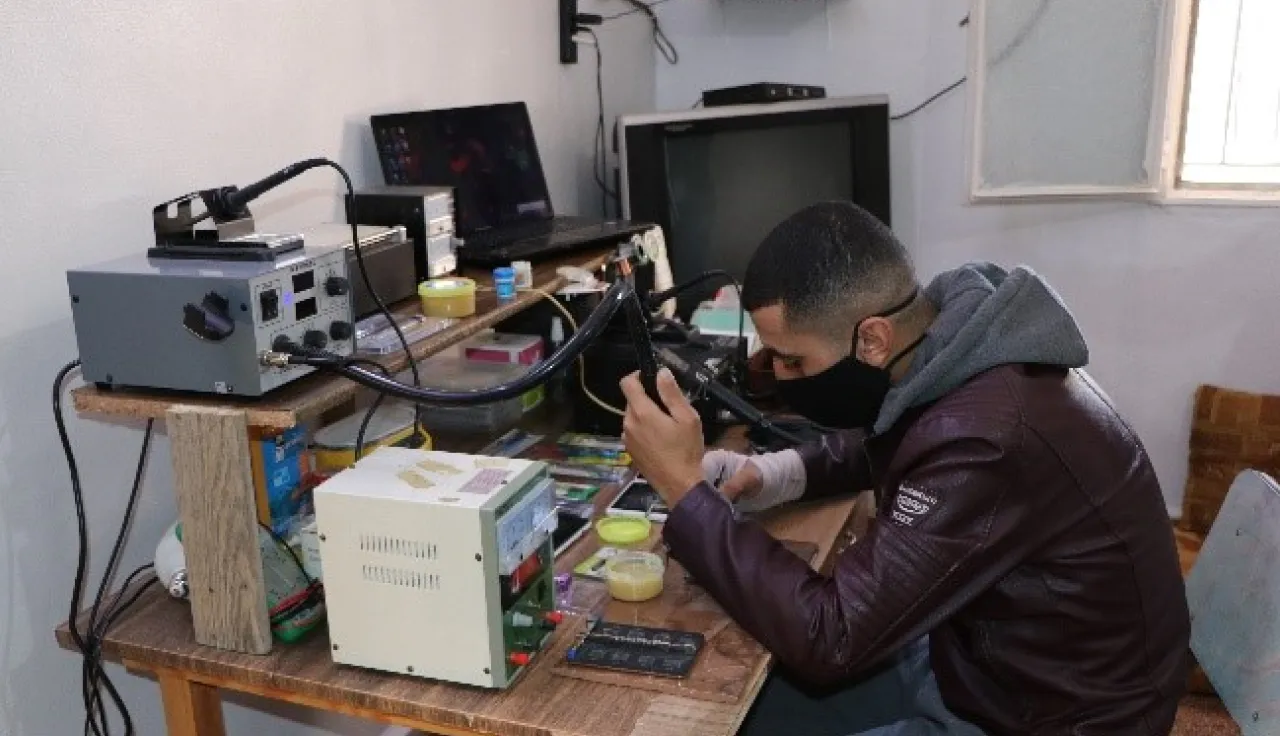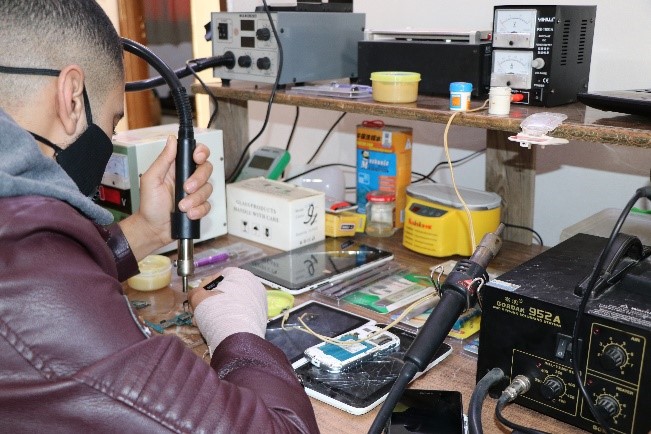How a Syrian refugee in Jordan survived the impact of the COVID-19 lockdown

“For me, the support that I have got from the ICRC helped a lot. I became a wholesale buyer of goods, unlike before. Parts are always available, and I don't need to go to the city for every device that needs maintenance.”
The Governorate of Mafraq is located to the north-east of the Hashemite Kingdom of Jordan and is one of the twelve Governorates making up the country. It has a population of over 500,000 people and is bordered by Iraq to the east, Syria to the north, and Saudi Arabia to the south and south-east.
The city of Mafraq was previously called Al-Fudayn, but the name was later changed to Al-Mafraq because it is located at an international crossroads that connects the Kingdom with the Iraqi Republic through Karameh Border Crossing, while the Jaber Border Crossing connects Jordan with the Syrian Arab Republic. The Amman-Damascus railway line passes through the city.
Mafraq is also known for its several historical sites, particularly of the Roman and Byzantine variety. They include ancient churches and water dams built by the Romans. Specifically, one of these – the Jawa Dam – is reputed to be the oldest known dam in the whole world and dates back to 3000 BC.
Today, the air is still in Mansheyat Ba ni Hassan District of Mafraq. Clouds envelope the sun and the sound of birds fill the air as they fly about on the horizon. Mohammad Mahmoud Al-Subaihi takes it all in and relaxes in his chair. He is a Syrian refugee who runs a small business maintaining and servicing mobile phones and other electronic devices.
Mohammad settles back further in his chair as he shares a bit of his experience with us. They are brief recollections of how he started his business, the impact that the COVID-19 pandemic had on it, and how he’s been coping since.
Mohammad arrived in Jordan in September 2012, quitting his education as the tragedy of the war in Syria inched dangerously close to him and his family. In desperation, he fled to Jordan and, as with many who escaped the fighting in their homeland, he was to find his new place of refuge hospitable and safe.
We wanted to know how he came up with his business idea and how it all began.
His face brightened up. "It was a hobby of mine before I came to Jordan," he shared. "The idea came because the most easily available job at the time I came was in construction and this was often tiring for me because when I was in Syria I had been in school and wasn’t working, let alone doing such a physically demanding job. So, I thought carefully about what I would like to do and elected to take a training course on how to fix mobile phones. I then prepared a project and submitted my plan to the ICRC. Fortunately for me, it was approved, and I began working.”

Mohammad at work fixing a faulty mobile phone. Rafah ALHADIDI /ICRC
How Mohammad’s business was affected by the COVID-19 pandemic and lockdown?
He paused for a while, apparently trying to put his thoughts together. “On the professional level, the biggest impact of the lockdown on the maintenance sector in my view was the increase it caused on all prices," he said. "This I think was due to the suspension of import and export. Furthermore, it affected transportation and for me, the fact that I live in the countryside made it rather severe because I often needed to go travel to the city since spare parts are only available there and I could not. Naturally, this was a problem for me and, overall, these factors negatively impacted my business.”
Did the support provided by the ICRC help lessen the impact of the pandemic on Mohammad’s business?
“For me,” Mohammad began, “the support that I have got from the ICRC helped a lot. I became a wholesale buyer of goods, unlike before. Parts are always available, and I don't need to go to the city for every device that needs maintenance,” he concluded.
From the experience of Mohammad Mahmoud Al-Subaihi, it was clear that the grant provided by the ICRC to some Syrian refugees who had been enrolled in the Micro-Economic Initiative (MEI) programme greatly helped them to cushion the effects of the pandemic on their various small businesses. Nonetheless, the expectation of many across the world is that the COVID-19 pandemic should be significantly curtailed so that things can return to normal once again and we all can go back to living our lives as before.



